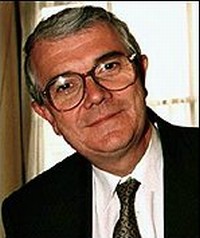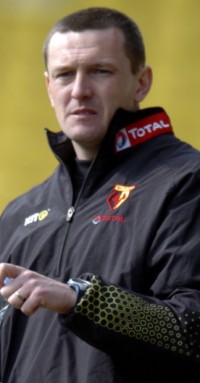The Burns Report into the structure of the FA doesn’t propose anything from left field. It identifies the problems with the FA that most of us have recognised for years – unrepresentative, a fertile ground for conflicts of interest, and dominated by the moneymen of the Premiership – and suggested sensible and down-to-earth solutions to those problems.
Remarkably, he seems to have steered an immaculate path through the self-interest and short-sightedness which pervades top level football, and won cautious support for his plans from all parties. If this tentative welcome does conclude with the complete adoption of the proposed reforms, then it will be a red-letter day for the sport.
The basics of his proposals are very simple. The FA should be led by a board of directors, including directors appointed by the professional game and the community game, executive directors and independent non-executive members. The unwieldy FA council should be reconstituted as a ‘Parliament of Football’, with seats representing not just the professional and pyramid leagues and the community game, but also supporters, referees, players and other interested parties. Amongst other proposals, there should also be an arms length Regulation and Compliance Unit, operating on a day-to-day basis independently of the FA. The Unit would tackle both on-field disciplinary issues, and also provide policing of the murky world of transfer dealings and agents.
So far, so good. The ideas seem essentially attractive. Yet there are plenty of sops to the established order buried within the detail, and the truth of the matter is that the domination of the game by the Premier League rich list will only be overcome by some bloody minded determination on the part of those charged with implementing the proposals – if indeed it is possible at all.
The idea of a football parliament is especially alluring, especially in principle. At last, it provides a genuine opportunity for real supporters to shape policies affecting the future of the game. Yet unfortunately, the plans suggest a maximum of 3 supporters seats out of up to 110 – whilst the Premier League and Football League have eight apiece. At the very least, it would make sense to have that many fans representatives – one for each professional division and the conference, and then three for the semi-pro structures. If nothing else, it is hard to see how so few representatives could ever be properly appointed, and how they could represent the diverse supporter interests which exist at different levels across the supporter spectrum.
Although the new board will include two Premier League representatives to the Football League’s single member - for no obvious reason other than that this maintains a status quo that the top league was presumably reluctant to relinquish - the presence of entirely independent members provides a welcome counter-point to the current perception of a board too heavily influenced by Premier League big hitters. Furthermore, Lord Burns indicates a desire to see the Chairman drawn from those independent members.
Similar accusations of self-interest have always tainted disciplinary procedures. At one point you may recall the FA appointing Graham Bean as a compliance officer – only for him to jack the job in, frustrated at the same lack of support and fear for the truth upon which calls for a truly independent regulator once foundered. Now, clearly, this is as close to an independent body as we are going to get. Burns describes it as ‘semi-autonomous’, which might not be completely convincing, but is better than nothing.
At least the report at last emphasises the importance of objectivity, independence and separation from other FA powers. It is in many ways a sad reflection that the policing and quasi-judicial functions of football should, in the 21st century, require this report to tease them away from the direct control of the policy makers and interest-group representatives – but, I suppose, it is better now than never.
Ultimately, it is impossible to resist the feeling that the reforms will count for little if they are not married to the appointment of high-profile, strong characters to the positions of power. The posts of head of the Regulation and Compliance Unit, the Chairman of the Board and President of the Council, will require thick-skinned individuals independent of the politics of the game but with a genuine feel for football. Such men are a rare breed, but it is in the unearthing of them that this whole enterprise will stand or fall.
One man who might find an outlet for his talents in one of these places is
For far too long, the FA has been akin to an old-boys club, with self-interested deals made in shadowy corridors on a sort of ‘scratch my back and I’ll scratch yours’ basis. It is clear that it must change, or it must die. This report offers a chance for the former. Perhaps it doesn’t really go far enough to overcome the prejudices which plague the governing body, but then Burns points out his aims included providing a report which all sides might be prepared to adopt.
The challenge now, then, is to take it forward and make it work. To ensure clarity and transparency, honesty and integrity, are at the heart of football, its governing body – and every club, and every game, under its control.
And whilst I have integrity on the brain, I can’t resist touching on the unrelated topic of Saturday’s events at
“I don’t think it changed the result, but of course it takes the gloss off the performance just a bit. No-one likes to see opposing players hospitalised, and I’ve apologised to Steve Cotterill for our part in delaying treatment. I can only hope he’s OK”.
That, of course, is roughly what Adrian Boothroyd should have said, reacting to Brian Jensen’s injury and
Unfortunately, he chose not to - instead declaring that, for him, ‘Winning is Everything’. If he has been misquoted, he ought to be getting those reported words clarified, for that is a grotesque thing to say in the context of a serious injury.
There was no foul on Brian Jensen, and it didn’t change the result anyway. We were already well beaten, both by
In the world of Golf, people talk in awe of Jack Nicklaus not just because he is the greatest player to have ever lived, but also because of the grace with which he conducted himself whilst going about the business of becoming a champion. In the midst of this summer’s enthralling Ashes battle, victors have found time to commiserate or congratulate adversaries, or show concern should they take a blow.
I accept fully that in the heat of battle it is possible to react wrongly, or make a mistake; to play on not realising the extent of an injury, or to flare up at the slightest provocation. The true test of character comes later, with calm and considered reaction. Boothroyd’s was simple: he had won, and that was all that counted.
No, my friend, it isn’t. Next to respect and decency, winning is a glorious irrelevance, and against a concern for human well being, it counts for not a jot. That is why Boothroyd’s crass reaction is so appalling.
Funnily enough, those most aware that winning isn’t everything often prove to be best at it. Perhaps that is no coincidence. And that sense of perspective is something Adrian Boothroyd, if he really wants to become a winner, would do well to heed.
